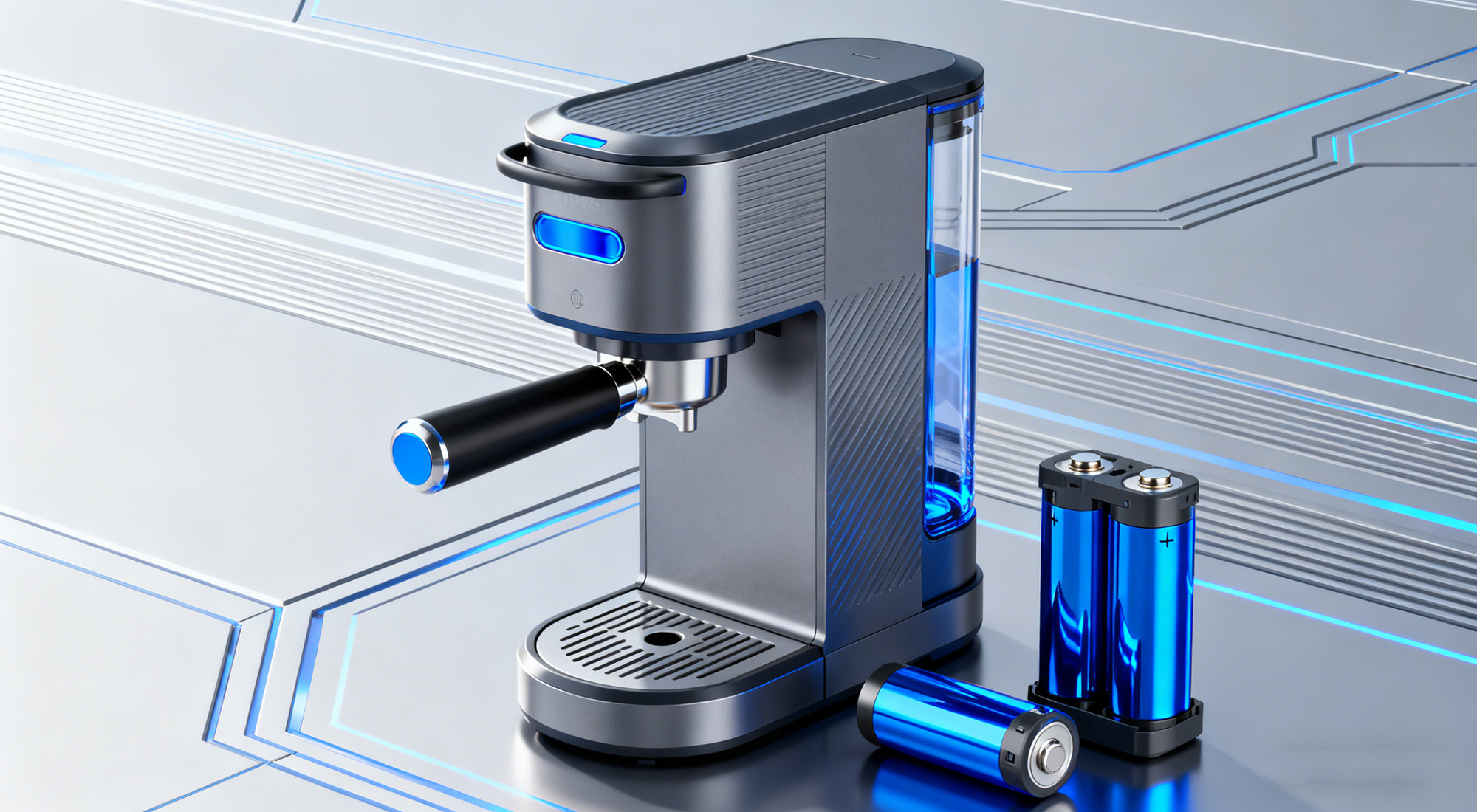
Battery Solutions for Portable Coffee Machines: Why Rechargeable Li-ion Packs Are the Best Choice
How custom high-drain lithium-ion packs unlock stable power, fast heating, and great user experience for portable coffee machines.
1. Portable Coffee Machines & Their Power Challenges
Portable coffee machines have become a fast-growing niche in the consumer electronics market, driven by remote work,
outdoor recreation, and the global demand for high-quality espresso anywhere, anytime. Whether used by travelers,
campers, baristas on the go, or office workers who need a personal brewing solution, the performance of a portable
coffee maker relies heavily on its power source.:contentReference[oaicite:0]{index=0}
Among all battery chemistries, rechargeable lithium-ion batteries remain the most efficient and practical choice.
At PKNERGY, we specialize in designing
custom Li-ion battery packs
tailored for demanding mobile appliances—including portable coffee makers that require stable, high-power output.
This article explains why Li-ion batteries are ideal for these devices, what technical requirements manufacturers should consider,
and how PKNERGY’s engineering capabilities support next-generation portable brewing products.
2. Why Portable Coffee Machines Need High-Performance Batteries
Brewing coffee is an energy-intensive process. Even compact espresso machines typically require:
- High pulse current for heating water quickly
- Stable output voltage to power the pump and heater
- Lightweight, compact energy storage for true mobility
If the battery is weak or unstable, users will face:
- Slow heating or inconsistent water temperature
- Reduced pump pressure, affecting crema and extraction quality
- Short runtime and poor user experience
- Overheating risks if the battery cannot support high load
Traditional alkaline or NiMH batteries don’t meet the needs of modern portable coffee makers. Manufacturers now overwhelmingly
choose Li-ion cylindrical cells (18650/21700) or Li-ion pouch cells for their high power density and excellent load capability.:contentReference[oaicite:1]{index=1}
For projects that require higher safety margin, long cycle life or operation in harsher environments, PKNERGY can also evaluate
custom LiFePO4 battery
solutions as an alternative chemistry.
3. Key Technical Requirements for Portable Coffee Maker Batteries
Portable coffee machines typically fall into two categories:
- Manual extraction with electric heating
- Fully electric espresso machines (pump + heater)
Both require a power system with the following characteristics:
3.1 High Discharge Capability
Heating elements may draw 10–15 A peak depending on machine design. High-drain INR 18650 / INR 21700 cells are ideal,
combining strong current capability with good safety performance.
3.2 Energy Density & Portability
Users expect the entire machine (including battery) to remain lightweight, often under 1.2 kg. Li-ion cells provide:
- Approximately 2–3× the energy of NiMH at the same volume
- Much higher energy density than lead acid and disposable batteries
- Longer cycle life and lower total cost of ownership
3.3 Safe BMS Protection
A professional battery management system (BMS) should include:
- Over-current and over-load protection
- Short-circuit protection
- Thermal protection with NTC/temperature sensors
- Balanced charging for multi-series cell packs
- Optional CAN / SMBus / UART communication for smart machines
3.4 Wide Compatibility with USB-C PD / 12 V Charging
Many brands now integrate USB-C PD charging, car charger input, and removable battery modules. This requires BMS and pack design
that support fast-charging protocols, current limiting, and safe input voltage ranges.
For portable appliances and consumer devices, PKNERGY also offers complete
consumer electronics power solutions
that combine battery pack, BMS, housing, and charging interface design.
4. Common Battery Pack Configurations
Based on typical power and runtime requirements, many compact portable coffee machines adopt the following pack structures::contentReference[oaicite:2]{index=2}
- 3S1P / 3S2P (10.8–12.6 V) – Very common for travel espresso machines.
- 4S1P / 4S2P (14.8–16.8 V) – Provides stable high-current output and higher heater efficiency.
- 6S (22.2 V) – Used when faster boiling or higher water temperature is required.
PKNERGY can optimize series/parallel configuration, capacity, and maximum continuous / pulse current based on the coffee
machine’s heater power, pump specifications, and target number of cups per charge.
5. Pain Points Faced by Portable Coffee Machine Manufacturers
During project communication with coffee machine brands and OEMs, we often see several recurring challenges:
- Heat management: Heater + pump generate a lot of heat in a very small enclosure, increasing thermal risk for cells.
- Inconsistent cell sourcing: Fluctuations in cell suppliers, batches, and grades can impact quality and performance.
- Custom mechanical structure: Limited internal space makes pack layout, brackets, and harness design difficult.
- Certification & logistics: Meeting UN38.3, IEC 62133 and transportation requirements for global shipping.
A reliable battery partner needs to support not only pack design, but also compliance, documentation, and lifecycle supply.
6. PKNERGY Battery Solutions for Portable Coffee Machines
With more than 15 years of experience in lithium battery design and manufacturing, PKNERGY provides complete solutions
for portable coffee machines::contentReference[oaicite:3]{index=3}
6.1 Custom High-Drain Li-ion Packs
We select high-drain 18650/21700 or pouch cells based on your power profile, then design the optimal series/parallel
configuration to achieve the required voltage, capacity, and peak current.
6.2 Smart BMS + USB-C PD Integration
Our engineers design BMS PCBs that integrate protection, fuel gauging, communication, and fast-charging support (USB-C PD, 12 V car input, etc.).
6.3 Compact Mechanical Integration
We cooperate with your industrial design and structural teams to optimize pack shape, brackets, connectors, and wiring harness,
ensuring an easy-to-assemble solution that fits inside your machine.
6.4 Compliance & Safety Support
PKNERGY supports UN38.3, IEC 62133 and related certifications, and provides documentation such as MSDS and transportation reports
to simplify your global market entry.
6.5 OEM / ODM Service
From concept verification to mass production, we offer flexible OEM/ODM cooperation. If you need broader solutions such as coffee vending equipment or
supporting power for other devices, we can integrate your project into our
custom Li-ion polymer battery
platform for faster development.
Already have a prototype portable coffee machine and need to upgrade its power system?
You can also combine the coffee maker battery with our
consumer electronics power solution
to build a complete product roadmap.
7. FAQ: Portable Coffee Machine Battery Design
Q1: How many cups of coffee can one full charge typically support?
This depends on heater power, water volume per cup, and battery capacity. For example, a 4S2P 21700 pack with 5000 mAh cells
can often support 3–5 espresso shots per charge in many travel machines. During design, PKNERGY simulates real usage scenarios
and helps you define a target “cups per charge” specification that matches your market positioning.
Q2: Is LiFePO4 suitable for portable coffee machines?
Most current products use high-drain Li-ion cells for better energy density. However, if your project prioritizes ultra-long cycle life
and high safety over compact size, we can evaluate
LiFePO4 battery customization
with an optimized mechanical design.
Q3: What certifications are required for exporting portable coffee machine batteries?
For most markets, UN38.3 is mandatory for transportation, and IEC 62133 (or country-specific standards) is recommended for
safety and product compliance. PKNERGY can provide test reports, MSDS, and related documents, and guide you through lab testing
if needed.
Q4: Can PKNERGY help with complete power solutions beyond the battery pack?
Yes. In addition to the battery pack and BMS, we can support charger selection, connector definition, wiring harness, and even
whole-device power solution design. For more information, please visit our
Consumer Electronics Power Solution
page or
contact us
directly.
8. Contact Miah — PKNERGY
If you are developing or upgrading a portable coffee maker and need a custom battery solution,
PKNERGY’s engineering team can support you from concept to mass production.
Contact Person: Miah (崔娟)
Email: sale@pknergy.com
Phone / WhatsApp: +86 139 0246 3897
Website: https://pknergybattery.com
You can also leave a message on our
Contact Us
page to get a fast quotation and technical evaluation.

